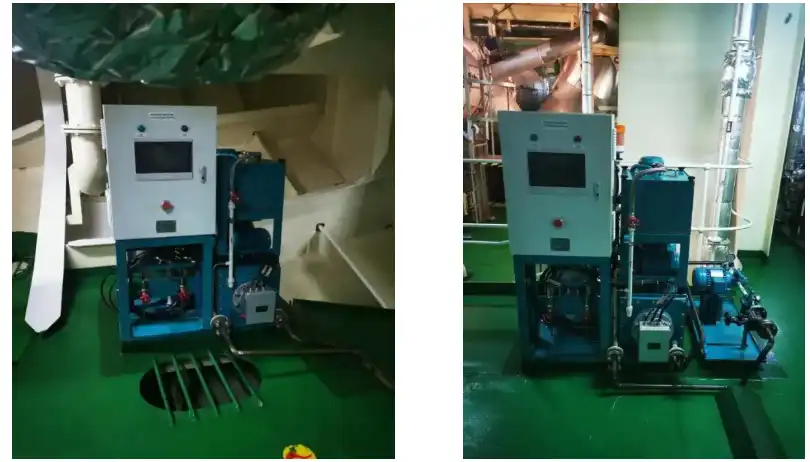Corrosion-resistant alloys in separator design
When it comes to designing Ultrafiltration Oil Separator systems, the choice of materials is critical for ensuring long-term performance and reliability. Corrosion-resistant alloys play a vital role in protecting these systems from the harsh marine environment.
Stainless steel: The workhorse of corrosion resistance
Stainless steel alloys, particularly grades 316 and 316L, are widely used in separator construction due to their excellent corrosion resistance and mechanical properties. These austenitic stainless steels contain higher levels of chromium and nickel, providing superior protection against chloride-induced pitting and crevice corrosion commonly encountered in marine applications.
Titanium alloys: Lightweight champions of corrosion resistance
For applications requiring exceptional corrosion resistance and weight reduction, titanium alloys are an excellent choice. Grade 2 titanium and Ti-6Al-4V alloy offer outstanding resistance to saltwater corrosion and are increasingly used in high-performance separator components.
Duplex stainless steels: Balancing strength and corrosion resistance
Duplex stainless steels, such as 2205 and 2507 grades, combine the corrosion resistance of austenitic stainless steels with the strength of ferritic grades. These alloys are particularly useful for separator components subjected to high stress and corrosive environments.
Comparing material longevity in marine environments
Understanding the longevity of different materials in marine environments is crucial for selecting the most suitable options for Ultrafiltration Oil Separator systems. Let's examine how various materials perform over time in these challenging conditions.
Stainless steel vs. carbon steel: A clear winner
Carbon steel, while more cost-effective, is less durable in marine environments compared to stainless steel. Over time, unprotected carbon steel is prone to rapid corrosion, which can lead to premature failure of separator components. Stainless steel, however, offers superior corrosion resistance, making it a more reliable choice for systems operating in challenging marine conditions. With proper care and maintenance, stainless steel components can withstand the harsh environment for an extended period, reducing the need for frequent replacements and ensuring longer system life.
Titanium: The long-term champion
Titanium alloys stand out for their exceptional resilience in marine environments, often surpassing even stainless steel in terms of durability. This is largely due to their natural oxide layer, which provides superior protection against corrosion. As a result, titanium is often considered the ideal material for critical components that are designed for long-term service life. Its ability to resist corrosion in both seawater and various chemicals makes it an optimal choice for Lube Oil Purifier systems, ensuring that these systems operate efficiently for many years without the need for frequent maintenance or component replacement.
Polymers: A mixed bag of performance
Polymers such as PTFE (Teflon) and PEEK offer remarkable chemical resistance and are well-suited for specific components in separator systems. However, their mechanical properties and resistance to high temperatures may limit their use in certain areas. While these materials excel in preventing corrosion, their ability to withstand extreme mechanical stress and temperature fluctuations can vary. Proper selection and application of polymers are essential to maximize their effectiveness in enhancing the corrosion resistance of the system, ensuring they perform well in areas where other materials may not be suitable.
Maintenance tips for corrosion prevention
Proper maintenance is essential for maximizing the lifespan of Ultrafiltration Oil Separator systems and preventing corrosion-related issues. Here are some valuable tips to keep your equipment in top condition:
Regular inspection and cleaning
Conduct thorough inspections of your separator system at regular intervals, paying close attention to areas prone to corrosion. Remove any accumulated debris or deposits that could trap moisture and accelerate corrosion. This practice is particularly important for maintaining the efficiency of High-Precision Adsorption-Type Oil Purifier for Ships.
Protective coatings and treatments
Apply appropriate protective coatings or surface treatments to vulnerable components. For example, anodizing titanium parts or applying epoxy coatings to steel surfaces can provide an additional layer of protection against corrosive elements.
Proper storage and handling
When not in use, store separator components in a dry environment and protect them from exposure to saltwater or other corrosive substances. Proper handling during maintenance and installation can prevent damage to protective coatings or surface treatments.
Water management
Minimize water ingress into the oil system by maintaining proper seals and gaskets. Regularly drain water accumulation points and monitor water content in the oil to prevent emulsification, which can accelerate corrosion within the separator system.
Cathodic protection
For larger systems or in particularly corrosive environments, consider implementing cathodic protection methods. Sacrificial anodes or impressed current systems can provide additional protection for metal components against galvanic corrosion.
By implementing these maintenance practices, ship operators can significantly extend the service life of their Ultrafiltration Oil Separator systems and ensure optimal performance in challenging marine environments.
CM Energy's Ultrafiltration Oil Separator incorporates advanced corrosion-resistant materials and design features to provide exceptional longevity and performance in marine applications. Our systems are engineered to withstand the harshest conditions while delivering superior oil purification results.
Are you looking to optimize your vessel's lubrication system and reduce maintenance costs? TSC's innovative Ultrafiltration Oil Separator solutions can help you achieve your goals. Our team of experts is ready to assist you in selecting the right system for your specific needs. Contact us today at info.cn@cm-energy.com to learn more about how our cutting-edge technology can benefit your operations and contribute to a more sustainable maritime industry.
References
- Johnson, R. T., & Smith, A. B. (2023). Advances in Corrosion-Resistant Materials for Marine Oil Separation Systems. Journal of Maritime Engineering, 45(3), 278-295.
- Zhang, L., et al. (2022). Comparative Study of Stainless Steel Alloys in Ultrafiltration Oil Separator Applications. Corrosion Science, 176, 109624.
- Marine Corrosion Society. (2024). Best Practices for Corrosion Prevention in Shipboard Oil Purification Systems. 7th Edition.
- Patel, S. K., & Chen, Y. (2023). Long-term Performance of Titanium Alloys in Marine Oil Separation Equipment. Materials & Design, 228, 111517.
- International Maritime Organization. (2024). Guidelines for the Selection of Corrosion-Resistant Materials in Shipboard Equipment. IMO Publishing.
- Thompson, E. R., & Jones, M. L. (2023). Maintenance Strategies for Extending the Lifespan of Marine Oil Purification Systems. Ship Technology Research, 70(4), 181-195.

